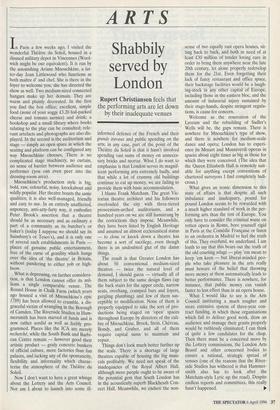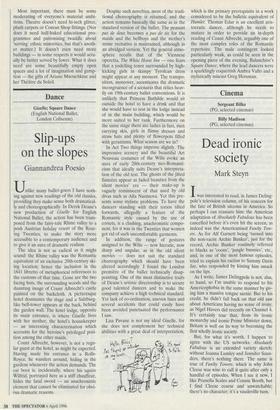ARTS
Shabbily served by London
Rupert Christiansen feels that the performing arts are let down by their inadequate venues In Paris a few weeks ago, I visited the wonderful Theatre du Soleil, housed in a disused military depot in Vincennes (Wool- wich might be our equivalent). It is run by the astonishing Ariane Mnouchkine, a lat- ter-day Joan Littlewood who functions as both maitre d' and chef. She is there in the foyer to welcome you; she has directed the show as well. Two medium-sized connected hangars make up her domain. They are warm and plainly decorated. In the first you find the box office; excellent, simple food (none of your soggy £3.20 foil-packed cheese and tomato sarnies) and drink; a bookshop and a small library where books relating to the play can be consulted; rele- vant artefacts and photographs are also dis- played. In the second is the auditorium and stage — simply an open space in which the seating and platform can be configured any way Mnouchkine chooses. There is no complicated stage machinery, no curtain, no sense of barrier between audience and performer (you can even peer into the dressing-room area).
Mnouchkine's production style is big, bold, raw, colourful, noisy, knockabout and wildly popular. Her theatre boasts the same qualities; it is also well-managed, friendly and easy to use. In an entirely unaffected, unponcey, anti-arty-farty way, it embodies Peter Brook's assertion that a theatre should be as necessary and as ordinary a part of a community as its butcher's or baker's (today I suppose we should say its Sainsbury's or Tesco's), and it is only one of several such establishments in Paris places of genuine public entertainment, free of the curse of gentility which hangs over the idea of 'the theatre' in Britain, without pandering to either yob or high- brow.
What is depressing, on further considera- tion, is that London cannot offer its mil- lions a single comparable venue. The Round House in Chalk Farm (which years ago housed a visit of Mnouchkine's epic 1789) has been allowed to crumble, a dis- graceful victim of wrangling in the Borough of Camden. The Riverside Studios in Ham- mersmith has been starved of funds and is now rather sordid as well as feebly pro- grammed. Places like the ICA are merely recherche, while the South Bank and Barbi- can Centre remain — however good their artistic product — grisly concrete bunkers of official culture, more factories than fun palaces, and lacking any of the spontaneity, flexibility and informality which charac- terise the atmosphere of the Theatre du Soleil.
Now I don't want to have a great whinge about the Lottery and the , Arts Council. Nor am I about to launch into some ill- informed defence of the French and their Brands travaux and public spending on the arts; in any case, part of the point of the Theatre du Soleil is that it hasn't involved spending vast sums of money on unneces- sary bricks and mortar. What I do want to emphasise is that London serves its magnif- icent performing arts extremely badly, and that while a lot of crummy old buildings continue to eat up money, we are failing to provide them with basic accommodation.
I blame Frank Matcham. The great Vic- torian theatre architect and his followers overloaded the city with three-tiered proscenium-arched auditoriums, and a hundred years on we are still hamstrung by the restrictions they impose. Meanwhile, they have been listed by English Heritage and assumed an almost ecclesiastical status — to close or knock down a theatre has become a sort of sacrilege, even though there is an undoubted glut of the damn things.
The result is that Greater London has about 50 conventional medium-sized theatres — twice the natural level of demand, I should guess — virtually all of them subject to the same design flaws (up the back stairs for the upper circle, narrow seats, overhang, cramped bars and foyers, gurgling plumbing) and few of them sus- ceptible to modification. None of them is properly equipped to take the sort of pro- ductions being staged on 'open' spaces throughout Europe by directors of the cali- bre of Mnouchkine, Brook, Stein, Chereau, Bondy, and Gruber, and all of them require capital sums to maintain and repair.
Things don't look much better further up the scale. There is a shortage of large theatres capable of housing the big musi- cals profitably. We need not speak of the inadequacies of the Royal Albert Hall, although more people ought to be aware of the potential gem that South London has in the acoustically superb Blackheath Con- cert Hall. Meanwhile, we endure the non- sense of two equally vast opera houses, sit- ting back to back, and both in need of at least £30 million of tender loving care in order to bring them anywhere near the late 20th century, let alone properly redevelop them for the 21st. Even forgetting their lack of fancy restaurant and office space, their backstage facilities would be a laugh- ing-stock in any other capital of Europe, including those in the eastern bloc, and the amount of industrial injury sustained by their stage-hands, despite stringent regula- tions, is cause for concern.
Welcome as the renovation of the Lyceum and the rebuilding of Sadler's Wells will be, the gaps remain. There is nowhere for Mnouchkine's type of show, and there is nowhere for medium-scale dance and opera; London has to experi- ence its Mozart and Monteverdi operas in spaces about eight times as big as those for which they were conceived. (The idea that the Queen Elizabeth Hall is remotely suit- able for anything except conventions of chartered surveyors I find completely ludi- crous.) What gives an ironic dimension to this state of affairs is that despite all such imbalance and inadequacy, pound for pound London seems to be rewarded with a much higher standard of work in the per- forming arts than the rest of Europe. You only have to consider the criminal waste on rotten opera in Rome, bore yourself rigid in Paris at the Comedie Frangaise or listen to an orchestra in Madrid to feel the truth of this. They overfund, we underfund. I am loath to say that this bears out the truth of the old courting adage — play 'em mean to keep 'em keen — but liberal-minded peo- ple who take pleasure in the arts really must beware of the belief that throwing more money at them automatically leads to better performance. There is nowhere, for instance, that public money can vanish faster to less effect than in an opera house.
What I would like to see is the Arts Council instituting a much tougher and more extensive system of three-year con- tract funding, in which those organisations which fail to deliver good work, draw an audience and manage their grants properly would be ruthlessly eliminated; I can think of quite a few candidates for the chop. Then there must be a concerted move by the Lottery commissions, the London Arts Board and other concerned bodies to ensure a rational, strategic spread of venues (one of the reasons that the River- side Studios has withered is that Hammer- smith also has to look after the Matcham-style Lyric up the road). Despite endless reports and committees, this really hasn't happened. 110. Most important, there must be some moderating of everyone's material ambi- tions. Theatre doesn't need hi-tech glitter, plush carpets or Conran Shop fittings. (Nor does it need half-baked educational pro- grammes and patronising twaddle about `serving' ethnic minorities, but that's anoth- er matter.) It doesn't even need more buildings — in some respects it would actu- ally be better served by fewer. What it does need are some beautifully empty open spaces and a lot of imagination and gump- tion — the gifts of Ariane Mnouchkine and her Theatre du Soleil.



























































 Previous page
Previous page